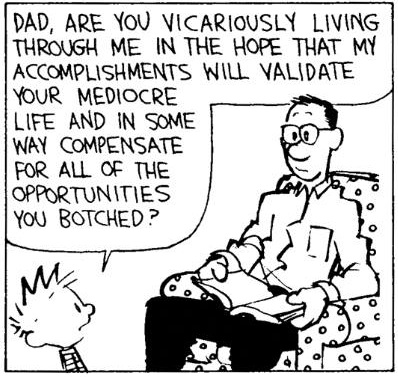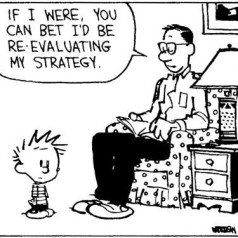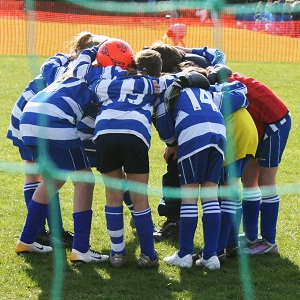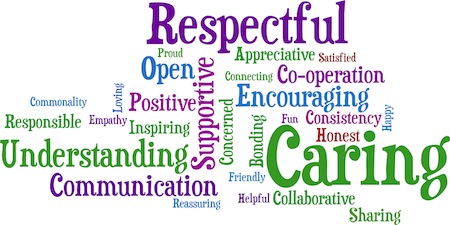As many as 90% of all volunteer coaches are parent coaches. There has been 2/3 major studies in this area of coaching both showing positive and negative results.
So many coaches start out as regular parents standing on the sideline every weekend cheering on their son or daughter. Little did they know that several days later they would be handed the club jacket, a list of players, parents details, some football, bibs, cones and a good luck and big pat on the back.
It can very daunting for someone who has never kicked a ball in their life and now has the task of managing and coaching a bunch of kids. Not many people will get the opportunity to coach their own kid, which can be a wonderful experience working together.
Many look back on this experience as the best moments in their lives but many kids also back on it as a very difficult time and in many cases – one that they would rather forget.
The Butterfly: There was a great story about a young boy who observed a butterfly unable to emerge from a cocoon. The butterfly appeared to be struggling and in pain. He rushed into the kitchen and brought out a scissors. He carefully snipped the cocoon open and the butterfly was free. But the butterfly’s wings where twisted. He later learned, the struggle and pain the butterfly must endure to emerge from the cocoon were necessary for it to fly. This story is so relative to how children learn, grow and deal with struggle and disappointment. Sometimes we just need to let them figure it out for themselves and not be so quick to propel them along.
Here are some tips I’ve learnt for making the joined experience a much more positive one for all concerned:
- Ask you child how they feel about you being involved with the team. They may not like the fact that you are involved (unlikely) and it’s good to know before you set out on this long journey as your child’s coach.
- Avoid parenting during training and game time.
- You are now in a position that requires you to wear two hats, one as a coach and one as a parent. In order to be fair you will have to explain to your child that he/she will be treated like everyone else. This is probably the most difficult part of the role switching from a coach to a parent and vice versa.
- Some people like to label the role, so during the sport you’re the coach/manager. (A bit like a teacher when teaching his/her own child(ren) in school.)
- If the other coach also has a child on the team, when giving individual instruction use what is know as the “cross-over approach”…. You work with other coach’s child and he/she works with your child. That way it keeps things separate.
- Never stop being a mum or dad and reaffirm how much you care for them always. You can never give enough praise once it’s specific.
- You may need to let you child know each time you talk to them as a coach or as a parent.
- Most parents who coach their son or daughter’s team generally end up being unfair to their child or give them more game time than the others. In many cases the child hasn’t earned that place or position through effort, skill or ability. There is nothing worse than a coach who favour his own son or daughter over others. You can be sure that the rest of the team will know if your being unfair and if they don’t, their parents will and it won’t be long before they are talking about you to others.
- On the other hand, the coach who is harder on his own child, can be holding that child back and preventing them from having a good relationship with that sport. It’s always good to ask your assistant if you are being fair to your child compared to the other players on the team. I’m yet to meet a coach who has gotten this part of the job 100% right all of the time.
- Again you have to treat everyone the same for better or for worse. If your child can get away with messing about during training, giving you lip or other forms of unacceptable behaviour other players would get reprimanded for you’re not setting a very good example. Be consistent with this.
- The worst thing you can do is talk bad about the other players on the team to your child. This will certainly put him or her in a very difficult situation with those players. Remember those are your child’s team-mates and it’s very important that you build team cohesion (togetherness) and not destroy it.
- Do you know enough about teaching the sport to be fair to everyone. This is probably going to be one of your biggest challenges. So you better be prepared to learn quickly. Put in the time and effort to develop your own game (Coaching).
- You might feel that you want to do some extra coaching with your child to improve them. Make sure, if you are doing this that it’s fun and not like training. Don’t wear your coach/manager hat, this is a time when you should definitely be wearing the dad/mum hat. This way he or she will be mentally fresh for team training rather then not knowing the difference.
” One positive aspect includes being able to spend quality time together. Additionally, the child perceives that he/she gets special attention, praise, and perks, such as being on familiar terms with the coach. In the child’s perception, having your parent as a coach is an opportunity to receive motivation and technical instruction that others on the team do not have. In the perspective of the parent, being both coach and parent provides the opportunity to teach values and skills, the opportunity to see how their child interact with friends, and the ability to see their child’s accomplishments and take pride in them” – Weiss & Fretwell 2005
Your time coaching your own child will pass by quickly, so make sure both of you are having a positive experience at all times. Don’t let winning get in the way of your decisions. Sport is a wonderful avenue to help your children learn valuable life long lessons. Do your part to insure that these lessons they are learning are constructive, positive and most importantly FUN! This is no easy task – so don’t be afraid to speak to other parent coaches and get their perspective on things both good and bad.
Weiss & Fretwell study also showed the negatives side for all concerned such as:
- Feeling pressure and higher expectations; being subject to unfair behaviour and more criticism for mistakes.
- Being on the receiving end of anger.
- The father-coach lacked empathy and understanding of the son’s perspective.
- Fathers reported feeling that it was difficult to separate the role of coach from the role of parent.
- There is also the perception that differential treatment exists for the coach’s son. This perception exists not only in the minds of the sons, but also in the minds of the parents and other teammates.
- The children of the coach received more negative feedback from their fathers than the other team members.
- Fathers viewed themselves as placing more pressure and higher expectations on their sons.
- Fathers felt they gave more recognition to other players.
- Teammates of the coaches’ sons reinforced the fathers’ views, saying that the “the coach was more likely to disadvantage his son compared to his teammates”
- Also some of the teammates did report feeling that the coach showed favouritism to his son.
These studies have limitations and cannot really be generalised to the whole population of parent-coaches and child-player. A small number of participants participated and they had not quite reached adolescence or who were just hitting adolescence. It was not the highest level of competition. The last two factors could affect the amount of pressure and anxiety perceived by the children.
Finally, try to act on the sidelines in a way that would make your son or daughter proud to have you as a parent and a coach. Remember, your child is not the only one that’s performing during the game (don’t follow them around with a spotlight over their head). You are also a performer (A SILENT ONE) and the quality of their experience is firmly in your hands. Conduct yourself in such a way that you clearly communicate to your child and those around you that this is just a recreational game for children, played by children because it’s FUN. It’s unlikely any of these kids will turn professional even if they believe in the dream. One thing is for sure these early years of participation are some of the best years of these young players life’s and it is our job to make sure these years are just that……… And always remember children don’t value winning as much as adults do. The most important thing is they do their best (give their best effort) for the team, each and every time they play and train.
I’ll finish by saying that without parent coaches we would have no game and most teams wouldn’t even exist. My advice is don’t coach your own child forever. It’s great at the younger ages but there is a time to step away and just watch them play. I would suggest that you devote some of your time to just being a dad or mum (supporting from the sidelines) and when it’s time to let go (as the coach), let go or else you might lose them forever.
Do you coach your own child? Have you any advice for parent/coaches?
-end
This is for you Joe!
Ref: Barber, Sukhi and White 1999, Weiss & Fretwell 2005
Barber, H., Sukhi, H., & White, S. A. (1999). The influence of parent-coaches on participant motivation and competitive anxiety in youth sport participation.
I always like to hear your opinions and views especially parent-coaches. If you feel you have something to say, please comment below or email me info@thecoachdiary.com If, you don’t have anything to add then please forward this on to a friend. As always, thanks for reading.
I’m also on twitter @Coachdiary









